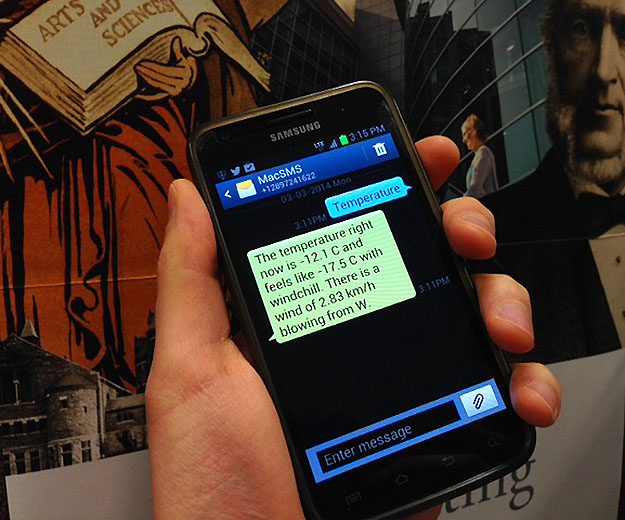Keep an eye on that iPhone: Examining the pitfalls of lost or stolen devices

Above: A McMaster student demonstrates the popular MacSMS weather app on his Samsung Galaxy smartphone. Business professors Zhiling Tu, Yufei Yuan and Norm Archer have been exploring the various security threats users face if they lose a mobile device.
Mobile devices such as cellphones, laptops and tablets are an important part of our lives.
They provide us with valuable services such as connecting with anyone around the world while accessing an unlimited amount of information.
They can also pose a huge security threat if lost or stolen.
McMaster business professors Zhiling Tu, Yufei Yuan and Norm Archer have been exploring the various security threats users face if they lose a mobile device, as well as the mechanisms to combat these threats.
The team has found that since mobile devices play an important role in both our private life (private photos, credit cards, personal contacts) and public life (sensitive work information), malicious third parties can potentially use the device’s information to affect our personal life and our career — as well as other people’s personal lives and careers.
However, the researchers acknowledge there are precautions users can take that can prepare us for the unfortunate loss of a device.
Most devices, for example, have settings which automatically lock or delete important information in the case that it is lost or stolen.
In spite of the security measures available to us, the researchers found that many users are either not aware or not willing to use them. When it comes to losing mobile devices, users are often in denial: They simply can’t fathom the idea of being separated from their mobile devices.
The researchers ultimately suggest to two measures that may keep mobile devices more secure:
Organizations can promote device security among users via awareness campaigns; and companies can enforce measures that could secure any sensitive information that might be on employees’ mobile devices.

